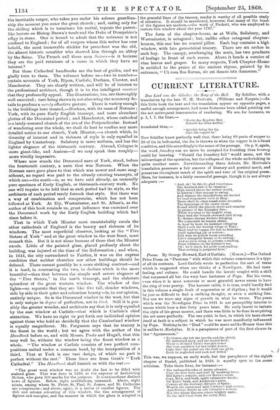CURRENT LITERATURE.
Dos Lied von der Glocke: the Song of the Bell. By Schiller, with a translation by the late W. H. Merivale. (Williams and Norgate.)—In this little book the text and the translation appear on opposite pages, a useful enough arrangement, had some footnotes been added pointing out the not nnfrequent inaccuracies of rendering. We see, for instance, on p. 5, 1. 7, the lines,— "Kocht des Kupfers Brei
Schnell das Elms herbal,"
translated thus,— "Quickly bring the tin,
Cast the copper in."
Now Schiller knew perfectly well that, there being 80 parts of copper to 20 of tin in bell-metal, the tin is thrown in when the copper is in a fused condition, and this accordingly is the sense of the passage. On p. 9, again, the ward foundery can no more be accepted for founding than brewery could for brewing. "Should the foundery fail" would mean, not the miscarriage of the operation, but the collapse of the whole undertaking in quite another sense. Notwithstanding these defects, Mr. Merivale's translation possesses a fair amount of literary and poetical merit, and preserves throughout much of the spirit and tone of the original poem. Here, for instance, is a fairly successful passage, though it is not always adequate :— "And, oh ! be this its glad vocation—.
The destined end of its creation!
High raised above the nether world, In heaven's blue canopy to swing.
And whence the thunderbolts are hurled
Its loud responsive voice to fling:
There shall its clear-toned notes resemble The hymnings of the starry choir, Round which the planets move and tremble In praises of the Almighty Sire ; While listening to the angelic song.
They lead the wreath-crowned year along.
To themes eternal welfare bringing We consecrate its brazen chime, As hour by hour, its hammer swinging Shall touch the waving wings of Time ;
Shall lend its tongue for fate to borrow—
Itself unfeeling joy or sorrow; Still with its hollow boom attending Life's changeful drama to its ending; And as each clang, so solemn sounding, Faint vibrates on the listener's ear,
Oh! let it teach, his pride confounding,
That nothing is perpetual here."






























 Previous page
Previous page